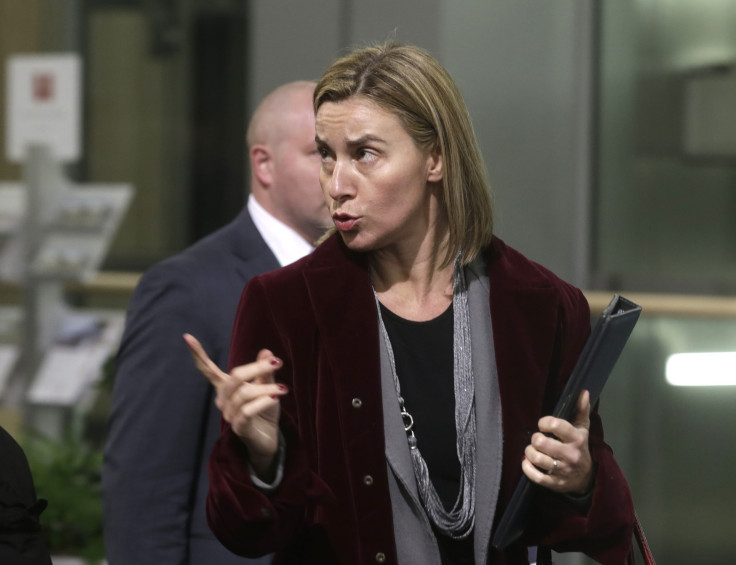Ukraine Crisis: EU Hints At New Sanctions On Russia, But Effectiveness Questioned

Ukrainian troops pulled out of Debaltseve, a strategic town in eastern Ukraine, on Wednesday after weeks of brutal fighting with pro-Russian separatist forces. The move raised questions about the effectiveness of a ceasefire agreement signed last week and blessed by Russian President Vladimir Putin. Now, European governments must weigh how to respond, most likely in the form of increased sanctions on Russian businesses and the country’s economic elite.
Three rounds of economic sanctions have hurt Russia's economy, but not deterred Putin. “We’ve seen that [sanctions] are not having the desired effect because Putin has shown his defiance against them,” said Sarah Lain, a research fellow at the Royal United Services Institute in London. “Regardless of the possibility of an economic collapse, he’s made it clear that Ukraine is the priority.”
On Wednesday, the European Union’s High Representative of Foreign Affairs Frederica Mogherini called for Russia and pro-Russian separatists to “immediately and fully implement” the Minsk agreements signed last week. The European Union “stands ready to take appropriate action in the case of fighting and other negative developments in violation of the Minsk agreements,” she said in a statement. Mogherini did not specify what those actions could be.
The most effective way to influence Putin’s decision-making would be to hurt the businesses owned by powerful Russian oligarchs close to Putin, said Lain. Oligarchs are major political figures in Russia and their favor often makes or breaks politicians. Putin could be swayed if his close allies begin to grumble about lost profits. But because sanctions take a long time to seriously affect businesses, the West shouldn’t expect any quick in Russian foreign policy from such tactics.
The EU enacted a smaller round of sanctions on Russian and Ukrainian politicians on Monday. The Kremlin criticized the bloc for what it says is a contradictory, aggressive action made a day after a ceasefire was supposed to take place per the Minsk agreement. Canada also enacted new sanctions this week aimed at 37 individuals and 17 Russian companies, including the oil giant Rosneft, which were similarly criticized by Russian Foreign Minister Sergey Lavrov, who called them “lame.”
Another round of sanctions would play into the hands of Russian leaders domestically, as well, said David Andelman, editor and publisher of the World Policy Journal. A strong, state-owned media machine often seizes on such “provocative” action and has highlighted Western politicians who are critical of their governments' stance on Russia throughout the crisis.
“I think he could very well use it as an excuse to say the ceasefire is broken,” said Andelman. “He will likely use it domestically to say, ‘look, the Kremlin has bent over backwards for a ceasefire and look what Europe is doing, they don’t want peace,’ and the Russian population will largely believe him.”
With the key railroad hub in Debaltseve now in separatist hands, the EU and United States probably will wait to see if the spotty ceasefire finally takes full effect. Both sides have pulled back some heavy weaponry per the Minsk agreement elsewhere on the front line, but according to the OSCE, the separatists refused to recognize a truce around Debaltseve.
Establishing an effective ceasefire was the first priority for leaders in Minsk, but it marks the beginning of a long diplomatic process that could take years to fully resolve. Ukrainian President Petro Poroshenko agreed to introduce a bill to Parliament by the end of the year to grant special status to Donetsk and Luhansk, the two breakaway eastern oblasts, but right-wing factions have already voiced their resistance to the bill. Separatists were also given control of their borders with Russia. Trouble on either of those issues could prompt renewed fighting.
Both the EU and the U.S. have imposed travel restrictions on select Russian businessmen and politicians and froze their assets abroad after Russia annexed the Crimean peninsula in March of last year. A month later, the U.S. added seven more Russian officials and 17 Russian businesses to the travel ban and asset freeze lists, while the EU targeted 15 individuals. The third round of sanctions in July had the most bite, as they targeted Rosneft, Novatek, Gazprombank and Vneshkonombank. Rosneft is Russia's largest refining company, while Novatek is the country's second-largest gas producer. Sanctions have been incrementally expanded to include Crimean businessmen, pro-Russian Ukrainian politicians and other influential Russians.
© Copyright IBTimes 2024. All rights reserved.





















